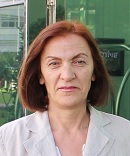
Plenary Lecture
Statistical Causality in Continuous Time and Applications

Professor Ljiljana Petrovic
Department of Mathematics and Statistics
Faculty of Economics
University of Belgrade
Serbia
E-mail: petrovl@ekof.bg.ac.rs
Abstract: Abstract: One of the goals of science is to find causal relations. This fact cannot always be done by experiments and researchers are restricted to observing systems they want to describe. This is the case in economics, demography and in many other fields. Causality is, in any case, a prediction property and the central question is: is it possible to reduce available information in order to predict a given filtration? Granger causality (C.W.J. Granger, Investigation Causal Relations by Econometric Models and Cross Spectral Methods, Econometrica. 37, 1969, 424—438) is one of the most popular measures to reveal causality influence of time series widely applied in economics, demography, neuroscience etc. The study of Granger-causality has been mainly preoccupied with time series. We shall instead concentrate on continuous time processes because many of systems to which it is natural to apply tests of causality, take place in continuous time. For example, this is generally the case within economy, finance, physics, medicine etc. First, we give various concepts of causality relationship between flows of information represented by families of Hilbert spaces and flows of information represented by filtrations. Then, we extend the given causality concept from fixed times to stopping times, i.e. we give a characterization of causality using σ-field associated to stopping times. The given definitions can be applied to stochastic processes. Then we apply the given causality concept to local uniqueness for the solution of the martingale problem. Also, we give some application in finance.
This work is based on the following papers:
[1] Gil, Lj. Petrovic Causality and Stochastic Dynamic Systems, SIAM J. Appl. Math., 47, 1987, 1361—1366.
[2] Lj. Petrovic, Markovian Extensions of a Stochastic Process, Satistics and Probability Letters, 78, 2008, 810--814.
[3] Lj. Petrovic, D. Valjarevic, Statistical Causality and Local Solution of the Stochastic Differential Equations driven with Semimartingales, Lecture Notes in Computer Sciences. Computional Problems in Science add Engineering, Springer, 2015, 261--269.
[4] Lj. Petrovic, S. Dimitrijevic, D. Valjarevic, Granger Causality and Stopping Times, Lithuanian Mathematical Journal, 56 (3), 2016, 410--416.
[5] Lj. Petrovic, D. Valjarevic, it Statistical causality, martingale problems and local uniqueness, Stochastics: An International Journal of Probability and Stochastic Processes, 1--14, 2017.
Brief Biography of the Speaker: Professor Ljiljana Petrovic received her M.S. degree in mathematics from the Faculty of Mathematics, University of Belgrade, Serbia and Ph. D degree in mathematics from the University of Kragujevac. Dr Ljiljana Petrovic is full professor in Department of Mathematics and Statistics on Faculty of Ecomomics, University of Belgrade. She served as a Head of this Department during 2009 -2015. She is author of 5 books and author/coauthor of more than 100 scientific papers published in international journals (SIAM Journal of Applied Mathematics, Statistics and Probability Letters, Sankhya A, Aequationes Mathematicae, Bulletin of the Australian Mathematical Society, Lithuanian Mathematical Journal, Stochastics - An International Journal of Probability and Stochastic Processes) or presented on conferences. Her fields of teaching and research are: Probability Theory and Mathematical Statistics – Stochastic Processes, Stochastic Analysis, Stochastic Differential Equations, Financial Mathematics. She is reviewer for Zentralblatt fur Mathematik and Mathematical Reviews and member of Editorial board of Matematicki Vesnik - journal published by the Mathematical Society of Serbia. She has participated on 11 scientific research projects financed by Ministry of education, science and technological development of Serbia.